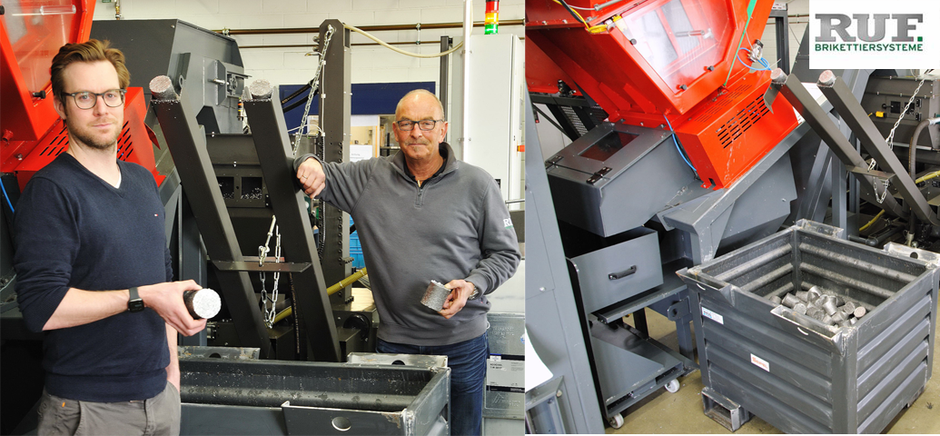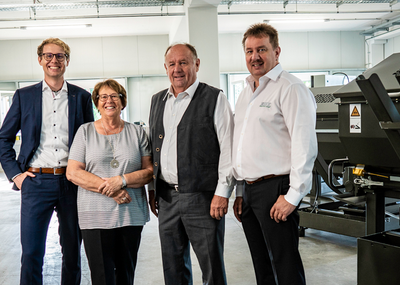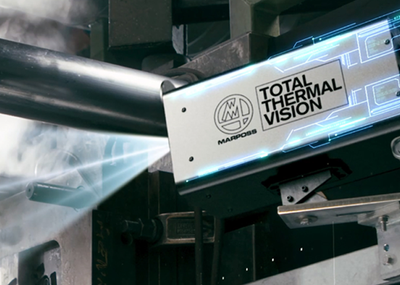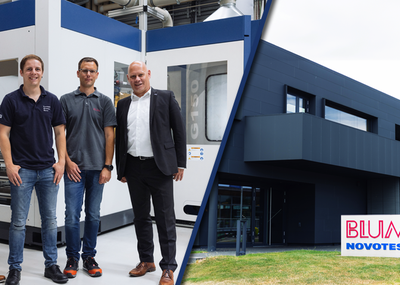Euler Feinmechanik GmbH produces high-quality aluminium products for its customers, who are mainly from the optical industry. A briquetting system from RUF additionally increases the efficiency of the contract manufacturer's machining. The automatically operating system turns voluminous and wet aluminium chips into compact and largely dry briquettes, which are marketed as a valuable secondary raw material.
The Euler Feinmechanik GmbH, located just outside the gates of the optics city of Wetzlar, is a successful company. This success is not by chance. The managing directors, Hans and Leonard Euler, son and grandson of the company's founder, consistently prioritize quality, reliability, customer-oriented approach, and cost-effectiveness in their contract manufacturing business. "However, when it comes to efficiency improvement through automation and digitization, one should not only focus on the core processes of turning and milling," emphasizes Leonard Euler. "Peripheral aspects, such as chip handling with our RUF briquetting system, are also very important," adds the 36-year-old Diplom-Wirtschaftsingenieur. The equation is simple: the less time machine operators spend on chip handling, the longer experts can dedicate themselves to productive activities, keeping their approximately 45 turning and milling centers running around the clock. The company processes approximately 38 tons of aluminum per month, generating about 25 tons of aluminum chips.
Briquetting minimizes volume and recovers cutting fluid
Handling chips consumes a significant amount of time and resources. They have an extremely high bulk volume, requiring a lot of space. Transporting them to collection containers and manually filling them is time-consuming. When they are coated with cutting fluid, they often contaminate production areas during transport and storage. Furthermore, wet chips yield reduced returns because logistics are complex, and chip processing before melting incurs additional costs, including the separation of cutting fluids, which then need to be disposed of.
Euler takes a different approach because compacting them into manageable briquettes solves all these problems. Depending on the type of chips, the volume is reduced to one-third to one-tenth. The cutting fluids are almost completely squeezed out during the pressing process. Storage and transport of the briquettes are simple and clean, and they have a consistently low and defined residual moisture content, eliminating any debate over moisture extraction during scrap marketing. In general, selling briquettes typically yields a medium to high double-digit Euro amount per ton compared to marketing loose chips. Not to mention that the squeezed cutting fluid can often be reused, resulting in typical payback periods of 1.5 to 3.5 years.
Efficiency improvement is a top priority at Euler
When Euler acquired a RUF press of type 11/4000/70 in 2019, efficiency improvement was the primary goal. Complemented by a pre-installed lifting-tilting device, shredder, chip conveyor, and a downstream filter system for cutting fluids, the system is designed for unmanned 24/7 operation.
Each machining center at Euler is equipped with roll-mounted chip collection containers. When they are full, a machine operator pushes them to the chip processing plant, where an empty container awaits. The operator removes the full container from the lifting device and pushes it in, initiating the process with the push of a button. The operator can immediately return to work with the empty 400-liter container without further involvement in the briquetting process. The container is automatically lifted about three meters in height and emptied into the shredder. The shredder breaks down long continuous chips and nests of chips, removing any potential foreign objects via a coarse-part outlet. The crushed chips are then transferred via a hinged belt to the press's funnel, equipped with a fill level sensor. The system starts automatically when the funnel is full and stops when all chips are briquetted. The RUF 11/4000/70 compresses the chips with its 11 kW powerful motor and a pressing pressure of up to 4000 kg/cm2, producing round briquettes with a diameter of 70 mm and a length of approximately 70 mm. The density of the briquettes is about 2.3 kg/l, not far from the raw density of solid aluminum, which is 2.7 kg/l. Simultaneously, the adhering cutting fluid is practically completely squeezed out and collected separately. The finished aluminum briquettes fall into a collection container, holding about one cubic meter.
Briquetting saves about 30 man-hours per week
Leonard Euler is highly satisfied with the success. He emphasizes, "The chip press has significantly contributed to the automation of our processes and the improvement of efficiency. The advantages were so clear-cut when assessing the investment that we didn't need to conduct elaborate analyses or detailed ROI calculations in advance." After the system was put into operation, it was indeed observed that the automation eliminated the manual effort, equivalent to about three-quarters of a staff position, which can now be allocated to productive tasks. This effect alone contributes to a rapid payback. In addition to efficiency gains, the contract manufacturer also enjoys higher revenue from briquettes instead of loose chips. Moreover, the reuse of cutting fluids results in substantial savings, as explained by Ralf Lorbach, technical advisor at RUF: "With an annual consumption of 40,000 liters of cutting fluid produced from 3,200 liters of concentrate, there is a potential of €12,000 to €15,000 per year." With the briquetting system, Euler is well-prepared for further growth. Currently, it processes an average of 40 kg of chips per hour, with the potential to handle up to 120 kg per hour.
Seamless integration without interface problems
The managing directors were pleasantly surprised by the smooth commissioning of the complete system. In fact, it consists of machines and components from several manufacturers: the RUF press, lifting/tilting equipment, and shredder from Erdwich, and the filter system from Polo. "We hardly noticed that we were dealing with different suppliers," praises Leonard Euler the good coordination and collaboration between the companies. "From day one, the cooperation with Mr. Lorbach worked very well; he coordinated everything, and we didn't have to worry about coordination between the involved companies," emphasizes the company's CEO. Ralf Lorbach explains: "We coordinate among ourselves, make suggestions to the customer, such as for control system integration, and finally, technicians from the involved companies jointly assemble the system at the customer's site." This brings clear advantages to the users, as Leonard Euler reports: "The entire system is interconnected without potential differences, meaning that, for example, when the coolant tank of the filter system is full, a sensor on the coolant tank signals this. This signal stops the filter system and informs the press, the shredder, and the lifting-tilting device, causing the entire system to stop and switch to standby mode. Once the coolant tank has been emptied, a button press is sufficient to restart the entire process. This provides a coherent integration." As reliable as the integration, the RUF press itself operates. "Low maintenance effort, no unplanned downtime – we are absolutely satisfied with the machine," summarizes Leonard Euler.
Euler Feinmechanik GmbH
is a family-owned contract manufacturer with around 80 employees, producing complex turned and milled parts for demanding and quality-oriented customers from a single source. Services also include post-processing, surface treatments, and assembly of assemblies. With 45 turning and milling centers, the company processes a wide range of materials, including various aluminum alloys, which dominate with around 75 percent. The company is located in Schöffengrund, on the outskirts of the optics city of Wetzlar, and therefore, it primarily serves the optical industry. However, strong growth drivers currently include vacuum and industrial






